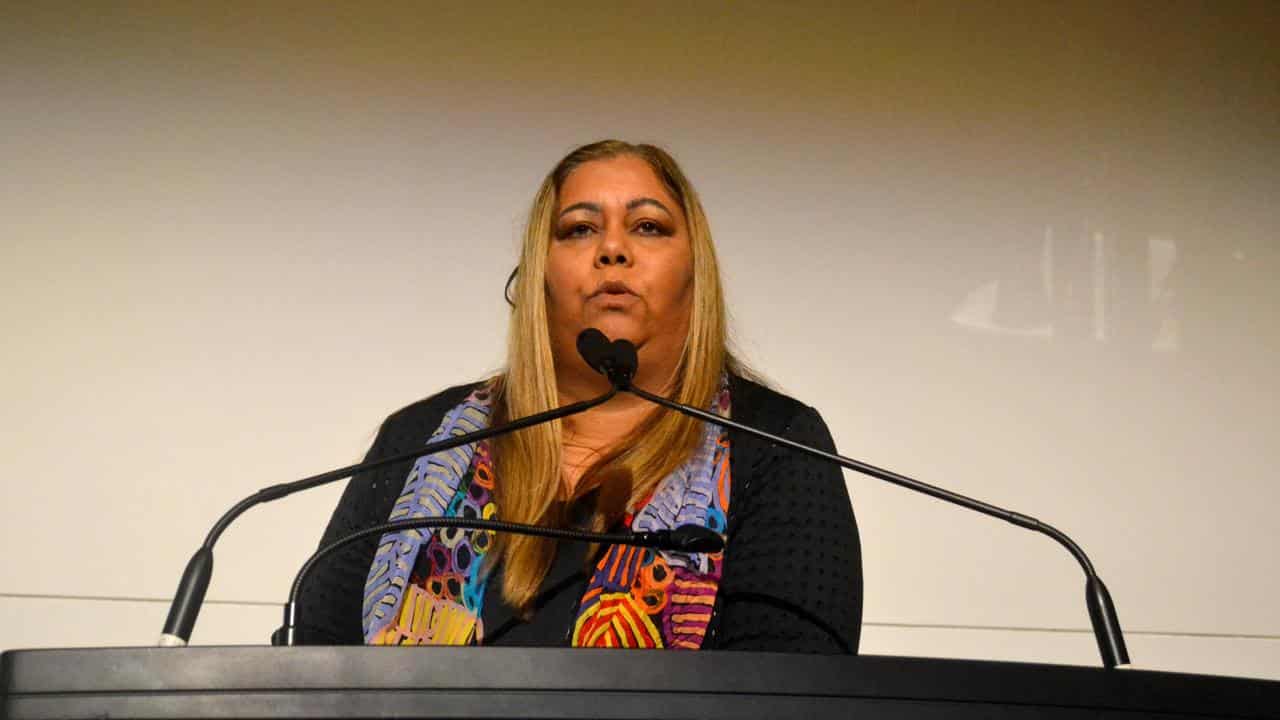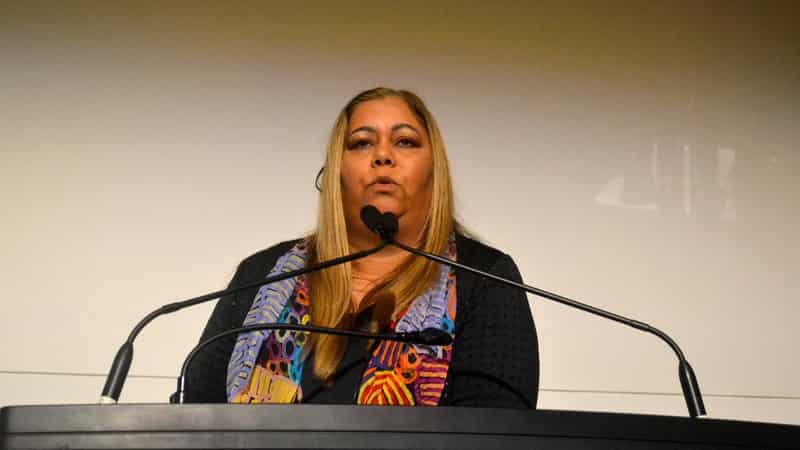
Sustainability expert Vanessa Elliot wants the mining industry to think a little differently about mine closures.
"I want you to think about the term ecological trauma," she told an international summit in Brisbane.
A Jaru woman from the Kimberley region of Western Australia, she is also a board member of a health service, Indigenous Business Australia, Desert Knowledge Australia and research centre Transformations in Mining Economies.
Ms Elliot wants others to see the "magnitude of connectivity" between the issues and identities of operators who step in when a mine is depleted.
"We need to start with the end point in mind," she told the World Mining Congress.
"I want you to think about how you embody and use First Nations people and traditional owners and near neighbours within your mining activities."
She was raised knowing of previous generations and the need to be a custodian of the land for future ones.
"When you're born as a First Nations person, you're born into a kin system where you are raised to be both a parent and child simultaneously," she said.
Her people were displaced because of mining, with men taken and working for rations or off droving across the vast plains.
"And there was a different type of frontier conflict that was happening to the women who were left behind," she said.
"So for me, I sit here amongst everyone in fellowship, but I hold the trauma in my body.
"We have a moral, educational and professional responsibility for everyone to understand the true impacts of mine closure."
Australia will be mining more, not less, to meet global demand for critical minerals.
Northern Land Council general manager Jonathan McLeod said there was evidence in the hills of his region of people living there for 65,000 years - and those who still lived there, holding vital knowledge.
"Mining in the Northern Territory is important to our economy - it's about a third of it," he said.
There are opportunities for employment, sub-contracting, land management and cultural monitoring.
But the industry has a poor record with rehabilitation in the NT, leaving communities with damaged and polluted country.
Mine closures are coming up and some have already happened, including the massive Ranger uranium mine near the town of Jabiru where the $2.2 billion rehabilitation will take another five years.
Rio Tinto is also preparing to close the Gove bauxite mine, with land on the peninsula to be returned.
Scientist and indigenous rights advocate Jim Walker said economic development flowed from participation with mining but also because of the agreements negotiated.
Mr McLeod said a key component of economic change in the East Arnhem region was the transition of land tenure from Rio Tinto to traditional owners.
"We have 3000 generations of people and knowledge and these mines they go for one, two maybe three generations if you're lucky," he said.
"We've got to look after them for the next 3000 generations, with huge responsibilities in terms of looking after people, sacred sites, our stories, our relationships with other people in our area."
Nalaine Morin, a member of the Tahltan Nation, joined the conference from an area in British Columbia, Canada, known as the "golden triangle" for its mineral resources.
She said Tahltan were the original miners in the territory and processed obsidian that was traded with neighbours who used it for spear heads and other sharp tools.
Her dad was a miner and she worked for Canadian mining companies when she first graduated, finding that Aboriginal people were not included.
"We're getting there," she told the forum.
"It wasn't an inclusive industry at that time."
Positive changes stemmed from the United Nations declaration of the rights of Indigenous people, and the fact that Aboriginal rights were protected in the Canadian constitution, she said.
"We are caretakers of our land and we will continue to play our role - that's who we are," Mr Morin said.
In British Columbia, mining activity is defined as a temporary use of the land and like many jurisdictions around the world there are regulations for what happens when they close.
"We also have the health safety reclamation code - it speaks very specifically to returning to a safe and environmentally sound state," said Ms Morin, vice-president for sustainability at Skeena Resources.
Echoing WA-based Ms Elliot, she said there was still work to do on covering the costs of mine closure.
She also warned the mining industry against using terms that didn't resonate with local communities.
"End land use objectives. Seriously, what is that?
"We're going to continue to use this land, in one form or fashion. We're going to exist on this land."
She said where nations had not been included in mine design and planning for reclamation, the process led to terms that were not collaborative or helpful.
"It doesn't align with our traditional laws or our rules as caretakers," she said.
"It interrupts our relationship with the land."
She said nations were teaching companies about the importance of cultural connections with the land, and companies were teaching nations about their findings through Western scientific study and analysis.
Ms Morin urged the industry to integrate Indigenous people into management teams and use Indigenous telecom, earthworks and monitoring companies.
"We need this level of collaboration to address challenges we're all facing," she said.









